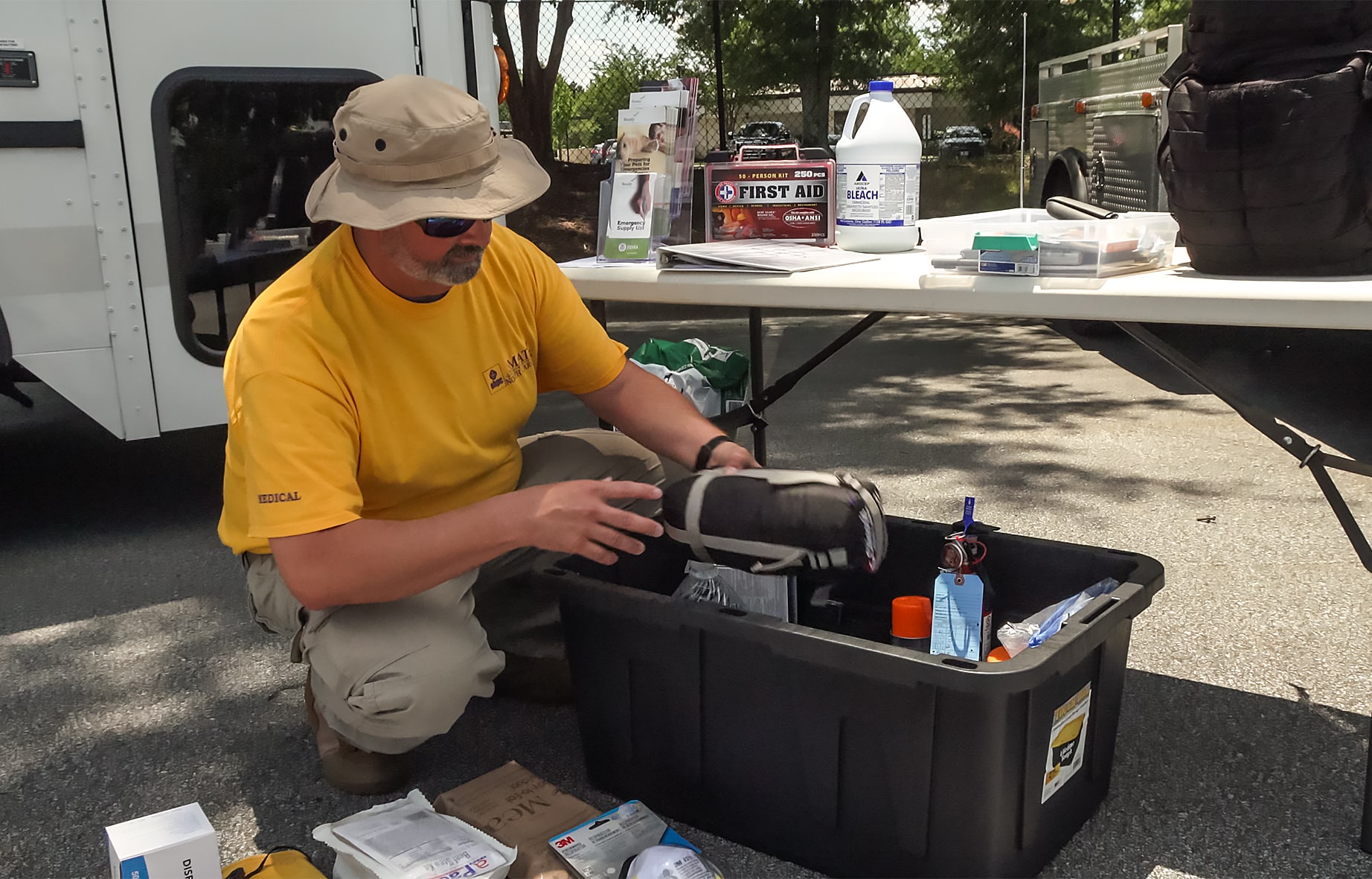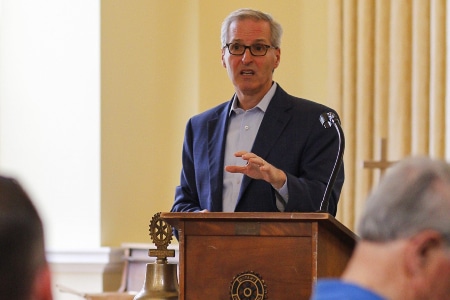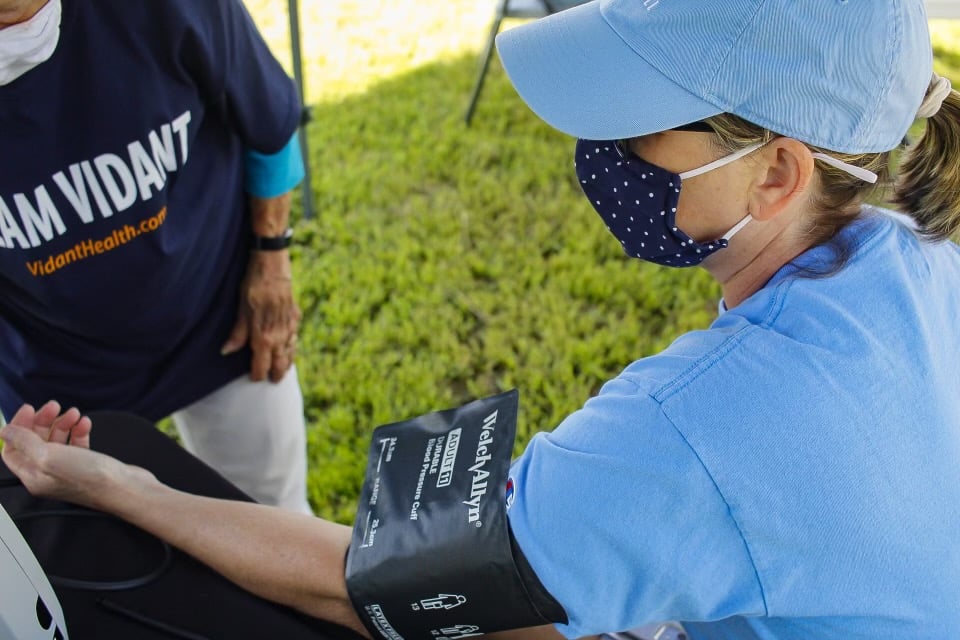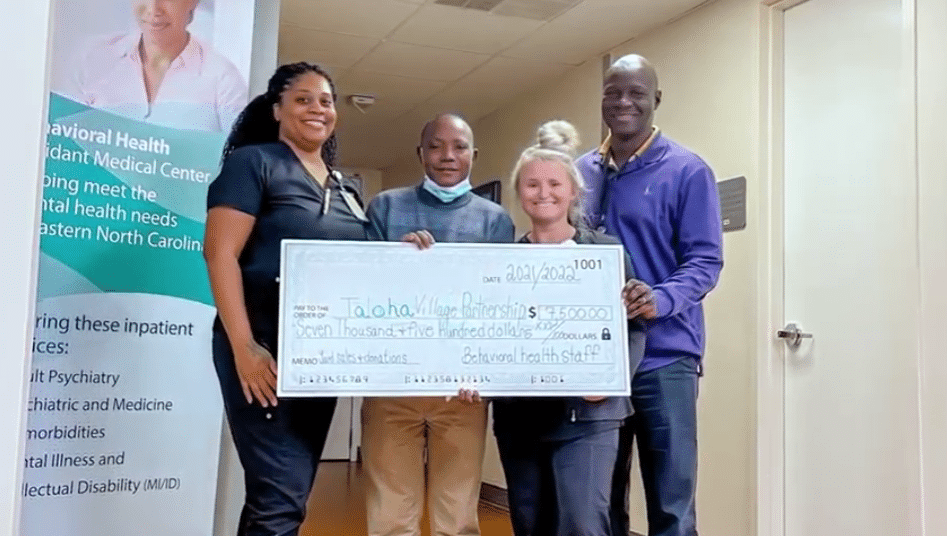At ECU Health, team members go above and beyond to form trusting relationships with patients and their families to better serve eastern North Carolina.
Over the last 14 years, Occupational Therapy Assistant Winnie Miller worked one on one nearly every week with Taylor Anthony, who is now preparing for his freshman year at the University of North Carolina Wilmington. Taylor is autistic and began receiving treatment from an occupational therapist when he was 3 years old.
First steps
Kim Anthony, Taylor’s mother, recalled the early days of her son working with an occupational therapist.
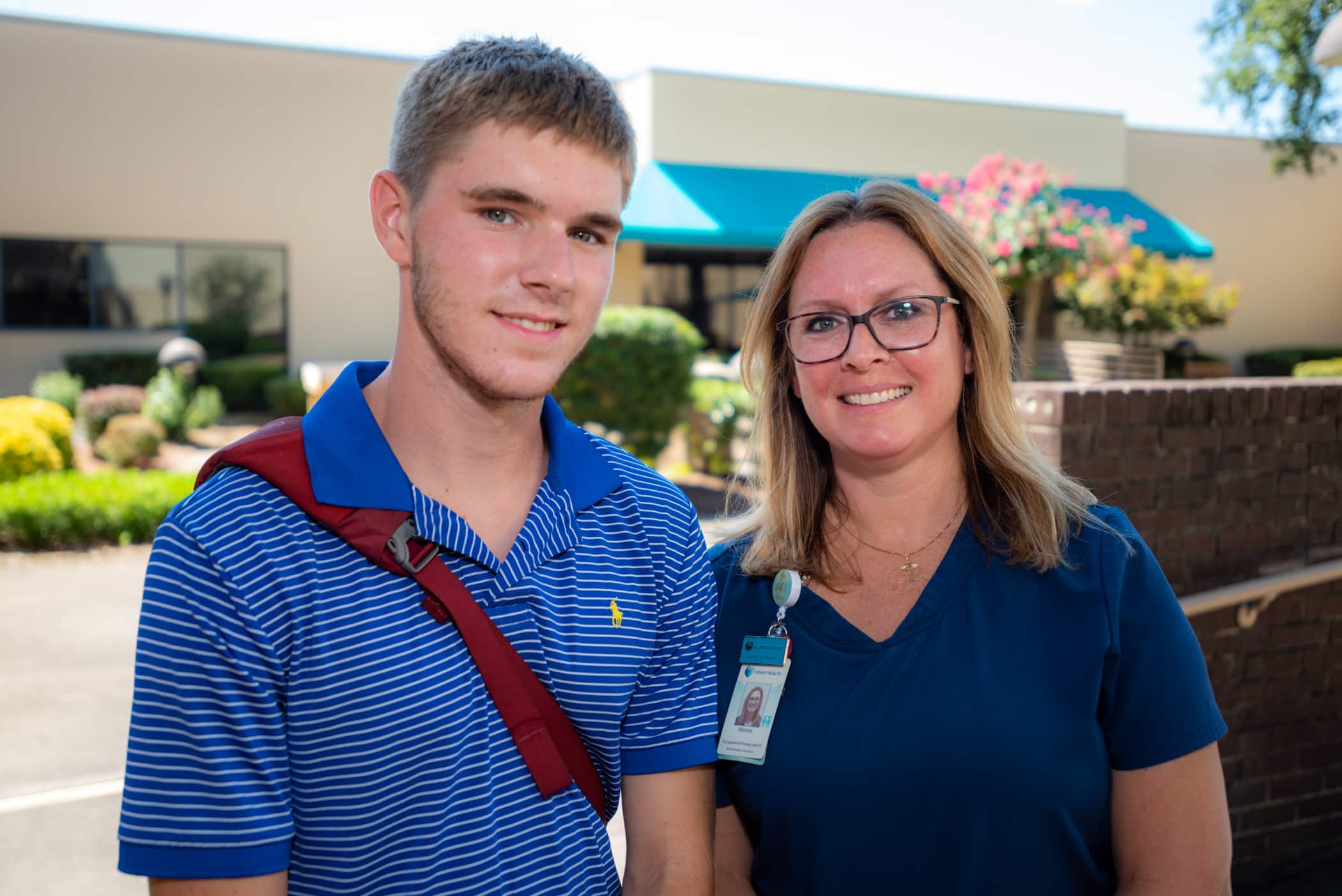
“He was my first child and had special needs,” Kim said. “I remember walking in and just being terrified – you don’t know what your future looks like, or his future, or will college even be an option.”
After about a year of working with a couple of other occupational therapists within the health system, Miller stepped in and began her treatment sessions with Taylor.
Miller said their work together started with the base steps – figuring out hand dominance, holding pencils, learning to write, forming letters and coloring within lines.
Kim said as Taylor reached school age, she’d be frustrated when hearing about things that people believed Taylor could not do. But she knew she could turn to Miller and her expertise to come up with a plan to help Taylor reach his goals.
“I would email her and be like, ‘I’m struggling with this’ and she would be like, ‘OK we’ll figure it out,’” Kim said. “She would have checklists for him and just everything. It was amazing. She was the biggest support system I had.”
Hitting their stride
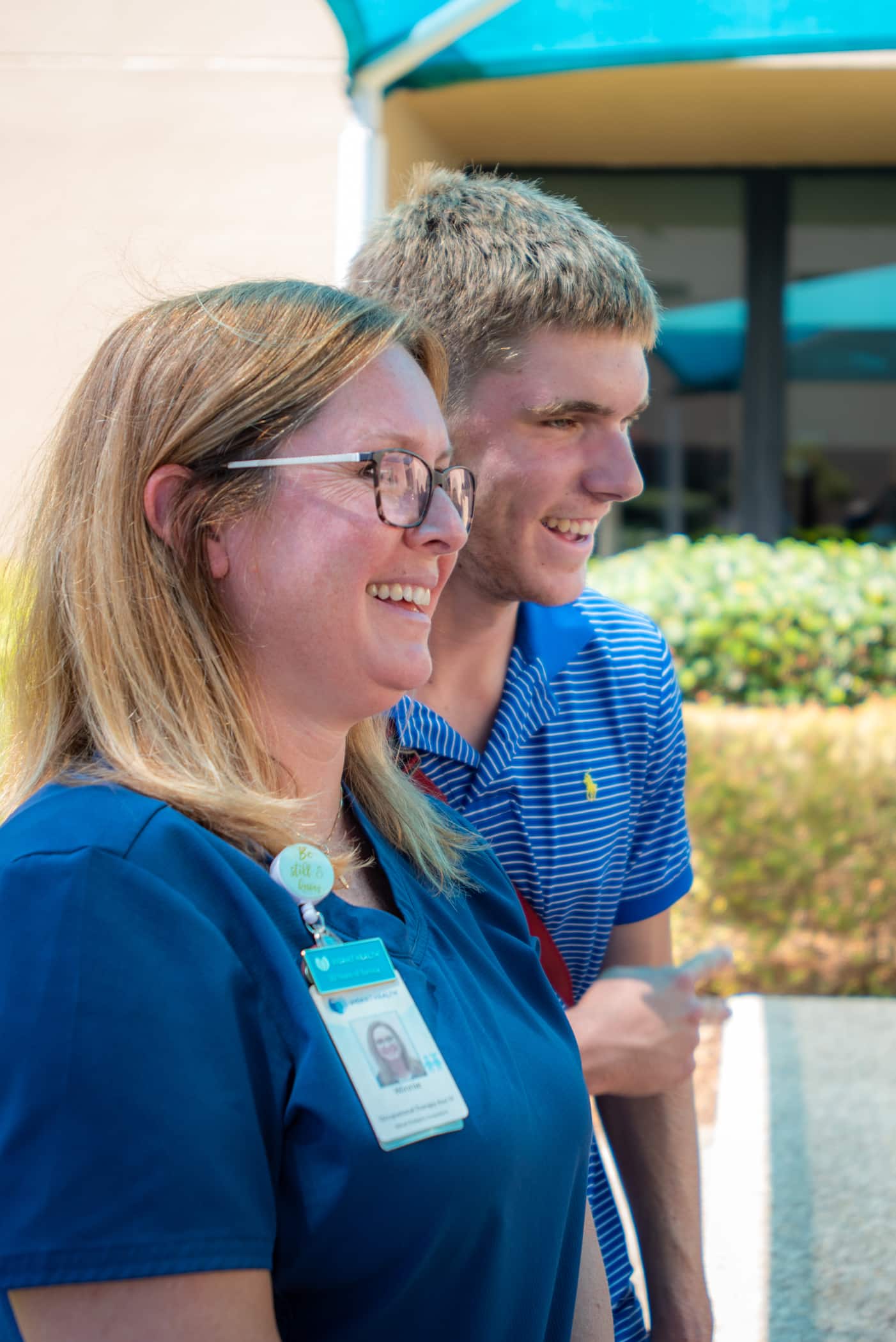
As Taylor got a bit older they worked on how to tie shoes and other fine motor skills. Then it was on to processing your environment and communicating clearly, social aspects of life, how to drive, and other elements of college life and living independently.
Miller compared her role as an occupational therapist to being a coach, with the patient’s supportive family as the team.
“The coach can give suggestions and a play-by-play plan of what you need to work on, but we’re just a little snippet,” Miller said. “I’m only with him an hour a week. They, as a team, have to work on those skills 24/7. I knew they were doing their work at home and there was always going to be follow through.”
Taylor’s father Stephen Anthony, director of service line development for Women’s and Children at ECU Health, said Miller’s out-of-the-box thinking greatly benefited Taylor’s growth into the young man he is today.
Miller broke down the learning process, kept his steps very goal-oriented and stayed in frequent contact with the Anthony family along the way.
“She made it manageable; she made it like they were just going to visit with each other. It wasn’t like a clinical visit, it was just, ‘Hey let’s go in my office and look at some stuff,’” Stephen said. “Maybe they do some stuff on the computer, maybe they use the kitchen to make some eggs or something like that, safety skills with the oven. Stuff that nobody would ever even think of.”
Off and running
These visits also included working with Helen Houston, an occupational therapy driver rehabilitation specialist, who addressed Taylor’s fitness to drive, to ensure he could approach driving safely.
Stephen said Taylor took one test as he was approaching driving age that showed his reactions and reflexes were borderline to be a driver. Before he took a driving test, he was put through the same tests, which showed about 75 percent improvement thanks to his hard work. Now, Stephen said Taylor is just as good a driver as anyone and probably safer than most his age because of the work he’s done.
Taylor said he was thankful for his time with Miller and he’s excited to take all he’s learned to Wilmington.
“It has meant a lot,” Taylor said. “I’ve definitely learned many things. It also took a lot to learn from a different perspective. My family means a lot. They’ve done everything for me to be sure I’ll be the most prepared human being. They’ll know I’ve learned enough to make good decisions and they’ll be supportive of me no matter what.”
As Taylor prepares for his first year of college, one where he’ll also compete as a member of the UNC Wilmington Cross Country team, his family knows he is prepared for different aspects of college life, thanks in part to his work with Miller.
Miller said she loved working with Taylor and can’t wait to visit with him when he returns from school and hear about his college experience.
“He was always an hour a week that I looked forward to,” Miller said. “He always had a new question for me or something new that kept me on my toes and I didn’t know what was going to be the question of the day, what we were going to have to explore and figure out. I really enjoyed that challenge. I’ve loved every minute.”
Resources
Learn more about Therapy & Rehabilitation services at ECU Health.
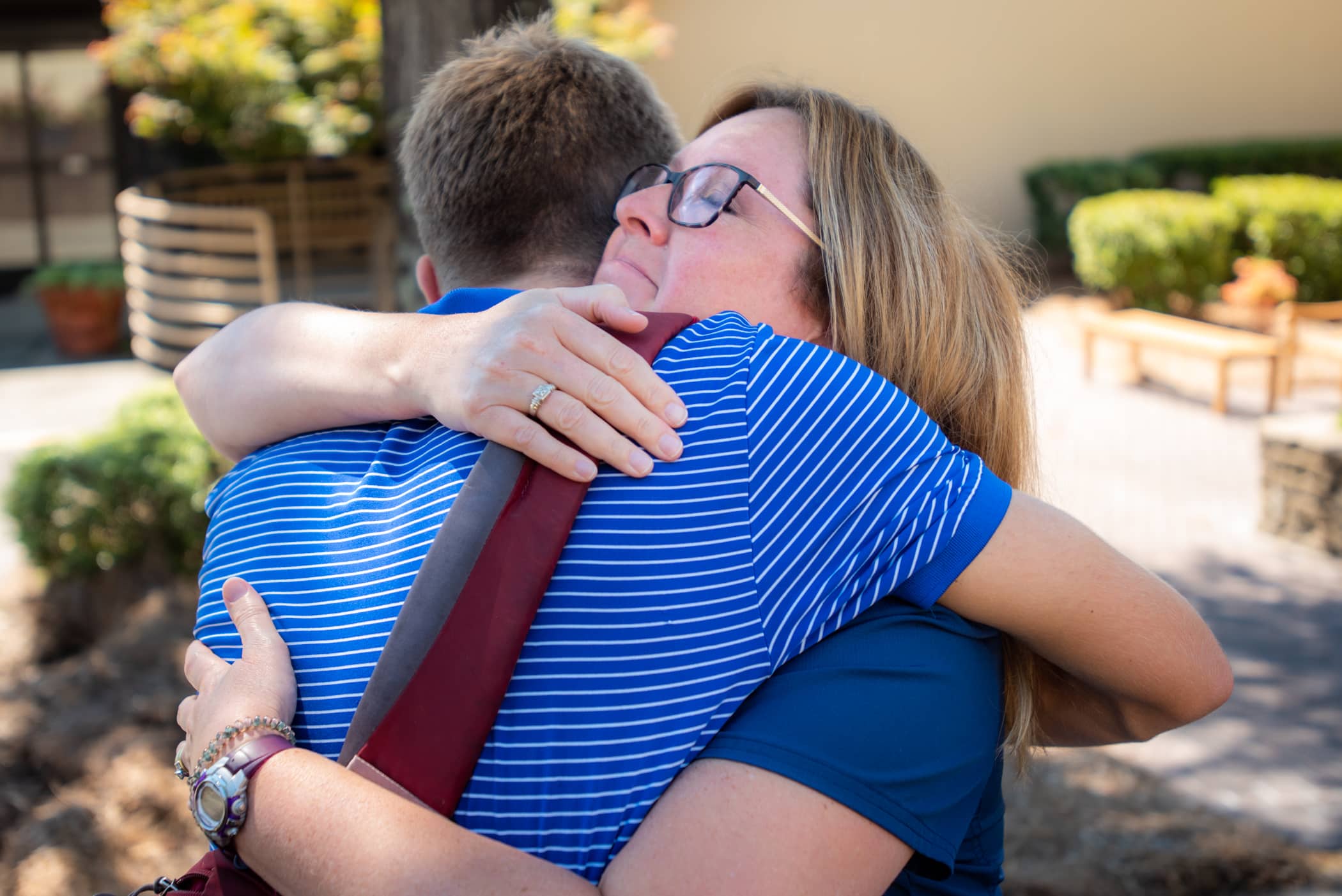
For the Eastern Carolina Healthcare Preparedness Coalition (EHCPC), being ready is part of the job.
“What we have here is our field communications support truck,” said Matt McMahon, disaster services specialist with EHCPC. “This is essentially the heartbeat of our mobile field hospital.”
From trucks that double as mobile hospitals to coordinating evacuations or the deployment of medical supplies, the coalition remains on standby for when emergencies strike or networks go down.
“So, if a hospital loses communication, whether it be phone, radio or internet, we can come and support them,” McMahon said.
The coalition provides a critical line of support, whenever and wherever it’s needed most. As they prepare for hurricane season, they want you to do the same.
“We want people to be prepared, and starting a hurricane kit is the first step in doing so,” said Chris Starbuck, health care preparedness coordinator for EHCPC.
A basic kit includes important items, like water, food and other supplies to last several days. Ready.gov is a federal government website with helpful information about how to properly prepare for a hurricane. Creating a plan that meets the specific needs of your household and building an emergency kit that contains at least 72 hours’ worth of supplies can help you stay adequately prepared for a natural disaster like a hurricane.
“Put all your important documents together – marriage certificates, birth certificates, wills,” Starbuck said.
Another item for your hurricane prep checklist – help others plan, too.
“Work with your neighbors, your communities, churches, because if we can prepare them, we can make a more resilient community overall,” Starbuck said.
Resources
Hurricanes can form quickly. Take the time now, before a hurricane impacts our region, to educate yourself on how to prepare and respond. Below are helpful links for federal and state websites:
- Ready.gov – Hurricane Information
- Ready.gov – Make a Plan
- Ready.gov – Build a Kit
- ReadyNC.org
- ReadyNC.org – Emergency Alerts
- ReadyNC.org – Evacuation Routes
- ReadyNC.org – Know Your Zone
Watch more ECU Health News videos
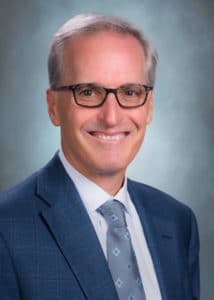
Dr. Michael Waldrum
When the new ECU Health brand was announced earlier this year, it was launched with a singular vision: to solve complex health care challenges preventing eastern North Carolina from realizing its immense potential. We know that a strong and vibrant health care system is necessary to grow and sustain healthy communities. Our region, which is home to 1.4 million hard-working people, faces disproportionate rates of chronic conditions – conditions that, when not managed early, result in high medical bills and financial hardship, particularly for those without insurance.
I am proud of the work we’ve done here in the East to create a premier academic health care system and none of this is possible without the incredible work by our health care professionals. They are living the ECU Health mission each and every day by purposefully delivering health care in our communities and training the next generation of health care professionals.
While we have much to be grateful for, it is also necessary to recognize the current state of health care across the nation, within all of North Carolina and here at home. Health systems and hospitals are facing financial challenges largely driven by the pandemic, labor shortages, inflation and market disruptions. Despite careful planning and the tireless efforts of our team members, ECU Health is facing the same unprecedented challenges as other health systems. Some of our current challenges stem from unexpected and extremely high labor costs in addition to the rising cost of supplies like medicine and equipment, which are significantly higher than they were just one year ago.
In rural regions like ours, navigating these realities is even more difficult. We already face a high burden of disease, a large geographical area where local providers and teams provide a literal lifeline to quality care and a large number of community members who don’t have access to adequate health insurance.
While we are making great progress in charting the future of health care in the East, the reality is our rural communities need immediate support from our elected officials on two fronts:
Medicaid Expansion: for years, ECU Health has consistently and vocally advocated for expanding Medicaid to support rural communities in North Carolina. Expanding Medicaid would increase access to high quality care for more than 500,000 North Carolina residents and provide coverage to treat chronic conditions, prevent illness and disease progression and support healthy, productive lives. It is the right thing to do for all of North Carolina and especially in rural communities where access to care is always a challenge.
Healthcare Access Stabilization Plan: health care across the state is also relying on state lawmakers to support this federal program that would provide North Carolina hospitals with up to $1.8 billion in funding. At no cost to the state, North Carolina can apply for this level of funding as a result of moving to Medicaid managed care. This program can help stabilize the financial well-being of rural hospitals as they continue to recover from the chaos of a worldwide pandemic.
As someone who has dedicated their career to health care, I know that in order to meet eastern North Carolina’s full potential, we must embrace the fact that a healthier community is a more economically vibrant community. It is imperative that we do not lose this opportunity to implement programs that will have life-changing impacts on so many North Carolinians. That is why it is vital that the General Assembly pass Medicaid expansion and move forward with HASP funding. Together, these efforts will help close the insurance gap, provide care for our most vulnerable community members, lower medical bills, bring much-needed dollars to the state and allow health systems and hospitals to continue to provide high-quality care to those who depend on it.
Michael Waldrum, MD, Chief Executive Officer, ECU Health
While skin cancer is less common in African Americans, experts say death rates from melanoma are much higher in the African American community. Melanoma, which often presents as an irregular mole, can spread much quicker and easier than most other skin cancers and can produce worse outcomes. Melanoma is often found in later stages in African Americans when treatment can require more intensive surgery or even radiation or chemotherapy. Knowing the signs and symptoms can help catch melanoma early, when the cancer can be cured.
African Americans are up to four times more likely to be diagnosed with advanced melanoma and 1.5 times more likely to die from melanoma, according to the Melanoma Research Alliance. This is alarming, considering African Americans account for a small portion of melanoma diagnoses.
Skin cancer is the most common type of cancer. The three major types of skin cancer are basal cell carcinoma, squamous cell carcinoma and melanoma. Basal cell carcinoma and squamous cell carcinoma can present as pink or scaly lesions that are not healing or spots that are bleeding, itchy or painful. These forms of cancer are largely treatable and less severe than melanoma, which presents as an irregular mole.
UV rays from the sun and tanning beds are responsible for most cases of skin cancer. While sun exposure from UV rays may contribute to some degree of skin cancer in African Americans, the genetic makeup plays the largest part in melanoma diagnoses.
“Melanoma shows up in areas that typically are not exposed to the sun, like the toes, tips of the finger or under fingernails and toenails,” said Dr. Tiffany Alexander, dermatologist, ECU Health. “When identified and treated early, most melanoma cases are curable.”
However, melanoma can spread quickly into the blood and to other organs if not found early, and can even be deadly. Knowing that African Americans are more likely to be impacted by advanced melanoma, Dr. Alexander recommends learning the signs and symptoms and taking early action to detect and treat melanoma in its earliest stages.
“African Americans typically present in a more advanced stage because there is not a lot of awareness of melanoma occurring in African Americans, and the perceived risk of melanoma among African Americans is typically low,” said Dr. Alexander. “Many people also neglect to check areas that are not typically exposed to the sun frequently.”
Completing regular self-exams of areas both exposed to the sun and areas not exposed, like fingers and toes can help catch irregularities early. The ABCDEs of melanoma can help in identifying odd or suspicious moles that may need a second look by a dermatologist.
- A: Asymmetric, irregular shape
- B: Borders that are irregular and not round
- C: Color – a mole that is differently colored than other moles
- D: Diameter more than 6 mm in size
- E: Evolving, growing rapidly, a mole that becomes symptomatic
One of the most common misconceptions is that people with darker skin do not get sunburned, according to Dr. Alexander.
“A common myth I hear from my patients is that people with darker skin do not get sunburned,” said Dr. Alexander. “While those with more melanin in their skin have more protection against the sun, I encourage everyone to wear sunscreen with a minimum 30 SPF, no matter skin color.”
Most importantly, Dr. Alexander says, pay attention to your body.
“Get out of the sun if you feel yourself burning,” said Dr. Alexander. “If there is a mole that fits in the ABCDEs of melanoma or a lesion that is not healing or spots that are bleeding, itchy or painful, see a dermatologist.”
Dermatologists provide professional and thorough skin checks and can identify potentially cancerous areas early, when treatment options are great and the cancer is curable. To find a dermatologist near you, please visit ECUHealth.org/dermatology.
ECU Health is proud to announce that the North Carolina Healthcare Association (NCHA) awarded Melanie Porter, administrator of hospital operations, and DeAnna Edwards, manager of hospital operations, the Healthier Communities award for their work in the Statewide Patient Movement Coordination Team. This award recognizes collaborative work by NCHA member organizations to promote health and well-being by addressing an identified community need.
COVID-19 has put a strain on health care systems across the globe and here in North Carolina. Throughout the pandemic, hospitals and health systems have worked tirelessly to advance new approaches to promoting more equitable health outcomes for patients, families and communities. Among these innovations, the Statewide Patient Movement Coordination Team emerged.
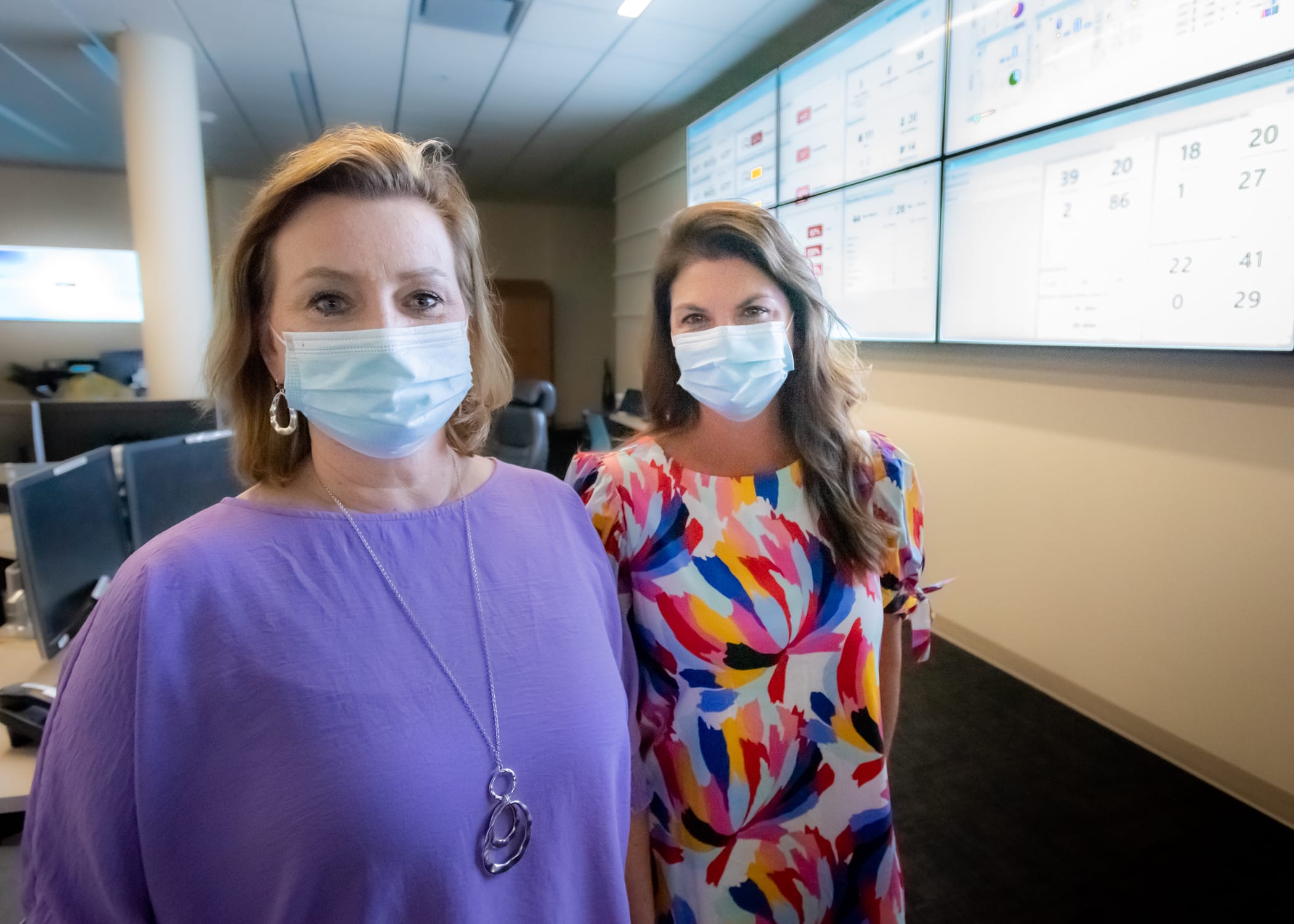
The Statewide Patient Movement Coordination Team is a group of individuals at transfer centers across North Carolina who have worked tirelessly during the pandemic to ensure critical patients needing higher levels of care were transferred or those facilities given additional clinical support.
As part of this team, Melanie and DeAnna are both dedicated to living the ECU Health mission of improving the health and well-being of eastern North Carolina. Through their work, they ensure patients have quality care and are connected to the level of care and resources needed.
The Statewide Patient Movement Coordination Team assisted 35 facilities not formally connected with the 13 transfer centers across the state who had critical patients needing higher levels of care.
In total, this team reviewed 765 patient movement requests during the Delta and Omicron surges of COVID-19.
Please join us in recognizing Melanie and DeAnna for representing ECU Health and making a difference in the lives of those we serve.
Leaving a child, senior or pet behind in a car can pose serious danger, even if it’s just for a few minutes.
That was the message of the hot car safety event hosted by Ellen Walston, Injury Prevention Program coordinator at ECU Health Medical Center, along with the Pitt County Health Department and the Martin-Pitt Partnership for Children.
Walston said it’s dangerous for anyone to be left alone in a vehicle because of how quickly they can heat up, but especially for children.
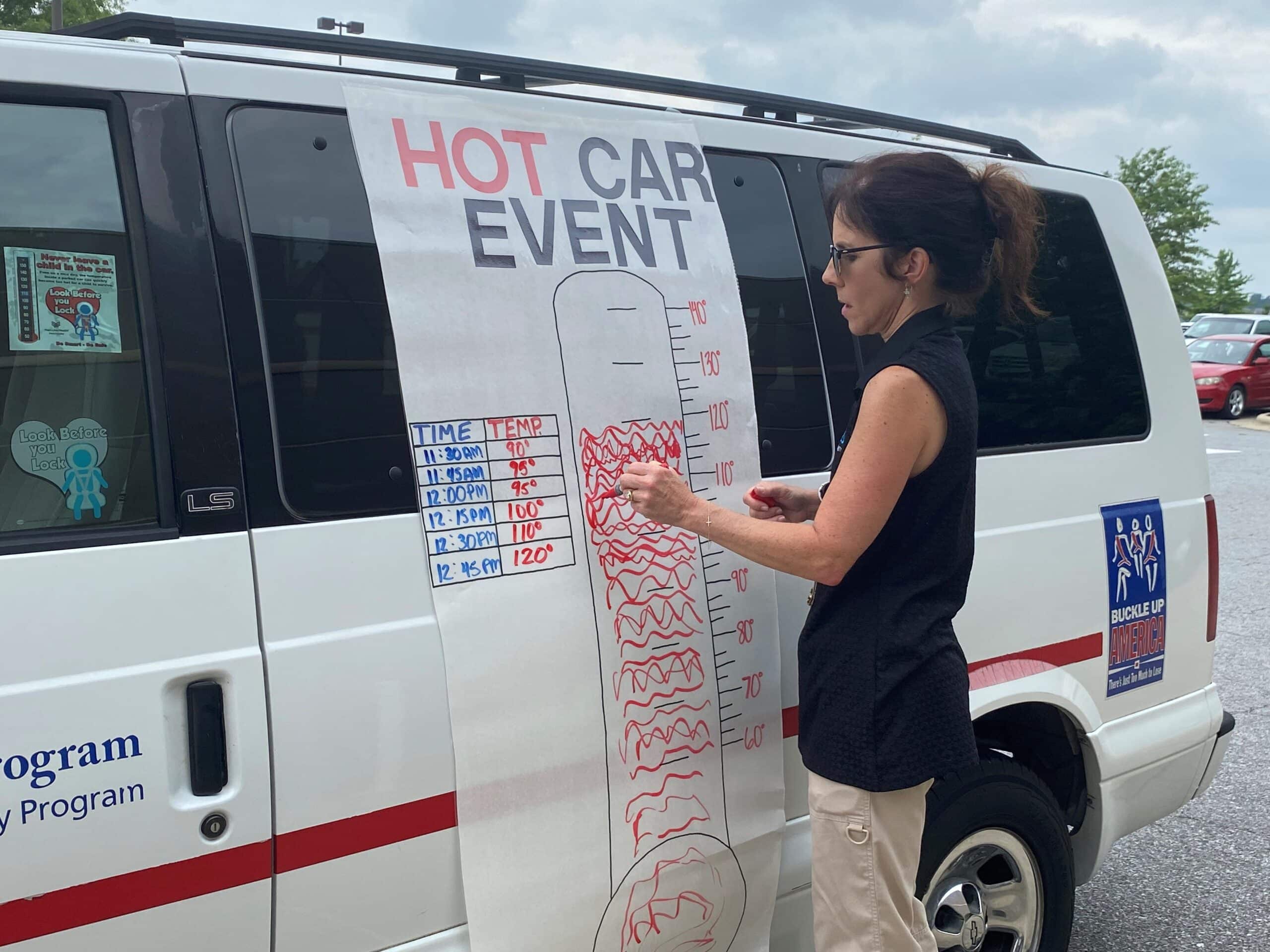
“Children’s bodies heat three to five times more quickly than adults,” Walston said. “They all have a smaller amount of body surface so they can’t cool themselves very quickly. A small child, like the families we’re serving today, they can’t verbalize when they’re thirsty if they’re under a certain age. You really have to be very careful. The message is never leave a child alone in a car, not even for a minute.”
The team had a demonstration with temperature gauges and s’mores roasting in a vehicle on an 80-degree day, one of the coolest days in recent weeks in eastern North Carolina. Despite the cooler than normal temperatures, the interior of the van rose to 90 degrees within 15 minutes, over 100 degrees after an hour, and approached 120 degrees in an hour and a half.
The s’mores demonstration showed how quickly things can literally cook inside of a car when left alone.
“As you see we have this temperature gauge here and just in the last 15 minutes, it’s already gone up 10 degrees,” Walston said. “This is a white car with light interior, and with a dark car and dark interior it can heat the car more quickly.”
Walston noted that there have already been 10 deaths across the country this year from children left alone in cars. In North Carolina, we have seen one this year and another in neighboring Virginia.
She said more than 50 percent of child deaths from hot cars are from children that have been forgotten in vehicles. She said children can be forgotten when routines are broken and leaving something like keys, your cellphone or a briefcase in the backseat next to the child is a safe way to ensure the child is not left alone.
According to Walston, about 17 percent of hot car fatalities are children that are intentionally left behind. She said no amount of time is safe for a child to be left alone, even with windows cracked.
“Many times folks think that, I’m just going into the store for a few minutes, but anything could happen inside, you could become distracted and forget the child,” Walston said. “There is a misnomer that if you crack a window and that will offer some less heat, but that really is a myth. It doesn’t affect the temperature of the car.”
As a rural health care organization, we know there are many challenges to fostering a healthy community. That doesn’t stop ECU Health team members from finding creative solutions to bring health care outside the walls of our hospitals and clinics in eastern North Carolina and into the communities we serve.
KaSheta Jackson, DNP, RN, vice president of Health Equity and Social Impact at ECU Health, and her team developed Community Pop-Ups: A Rural Approach, an innovative health care delivery model implemented as community-based pop-up clinics across eastern North Carolina to address social and economic health care barriers.
This program makes health care both more accessible and approachable by directly providing preventative services, improving health care equity, and offering resources within communities with the greatest need.
Jackson was recognized earlier this year by the American Nurses Association (ANA) and the American Nurses Foundation (the Foundation) as the recipient of the 2022 ANA Innovation Award. The ANA Innovation Awards highlight, recognize and celebrate exemplary nurse-led innovations that improve patient safety and health outcomes. The innovation award also generated a $25,000 grant, which will fund future community health events.
Jackson said nurses are on the leading edge of connecting their fellow community members to health care and should feel empowered to innovate in that space.
“Our innovation has empowered many nurses to think and behave differently with regards to changing health care delivery and where care is delivered,” Jackson said. “By aligning the community and the health care system, we are addressing social, economic, equity, and population health, allowing us to meet our mission of improving the health and well-being of eastern North Carolina.”
Through partnerships with community leaders and other ECU Health team members, these clinics have evolved from solely offering health care screenings to providing COVID-19 testing, vaccinations, mental health resources, access to fresh produce and employment opportunities.
In 2021 alone, Community Pop-Ups provided care to more than 400 community members, identified acute diseases, provided numerous jobs, gave away 500 produce boxes, and delivered 500 health passports in rural locations across eastern North Carolina.
“We are following the model of doing health care on the outside to make health care better on the inside,” Jackson said during a July 2021 community health event in Farmville. “We’re working to address the social determinants of health, offering employment, trying to take care of the need for vaccines, taking health care into communities versus having people come to us – we’re taking services to those that need them.”
As these pop-up events evolve and grow, Jackson hopes they will help create a healthier eastern North Carolina, strengthen ties between community organizations and improve relationships between community members and health care providers.
“I am so excited to see our innovation become reality,” Jackson said. “The advice I would give to any nurse who wants to take their innovations from just an idea to action: be inquisitive, be nosey, ask questions, listen and it will be easy to make it happen.”
This is just one example of how Jackson and her team break down barriers to bring health care to the communities we serve. ECU Health also hosts a myriad of community events including: a foot clinic with Joy Soup Kitchen and Access East, which gives free foot care supplies to diabetic patients who visit the event, over-the-counter medication giveaways and Kids Eat Free with Sodexo, which provides free lunches and afternoon snacks for kids and teens up to age 18.
For more information, visit the Pop-Up Community Health Events page on our website.
Health care workers are well-versed in serving their community, even if that community happens to be an ocean away.
“I’m from Tanzania, east Africa. In a rural village called Taloha,” said Daniel Makoko, behavioral health team member at ECU Health.
After settling in eastern North Carolina, Makoko continued to help improve living conditions in his home village.
“The village has one primary school,” Makoko said. “So these kids use like four classrooms but there are like 270 kids. They share the classroom because it’s not enough. But also the main problem was that the room was leaking when it’s raining.”
So Makoko set about raising money through donations and events like yard sales to put a new roof on the primary school.
“They asked me, ‘What can we do?’ So I told them that if we can get a roof for them, It will be much transformation for the school,” said Makoko.
A transformation in more ways than one, made possible with the help of friends, family and colleagues.
“He’s a great inspiration to me just to see all the things that he has accomplished”, said Tony Dixon, a behavioral health team member at ECU Health. “Between four yard sales and donations from behavioral health services, we were able to raise the four-thousand dollars to get the roof done.”
“I was able to go there and implement the project and we finished the roof and the kids were so happy,” said Makoko.
It’s joy no roof can contain and an example of ECU Health values making a difference half a world away.
“This shows the greatness of the people here and how they are able to respond to the needs of other people across the world,” said Makoko. “I really appreciate it so much.”
Resources
Watch more ECU Health News videos
ECU Health CEO and Brody School of Medicine Dean Dr. Mike Waldrum named to AAMC’s Board of Directors
Dr. Michael Waldrum, dean of East Carolina University’s Brody School of Medicine and chief executive officer of ECU Health, has been named to the board of directors of the Association of American Medical Colleges (AAMC). He joins 18 other medical school and health care leaders from across the nation and Canada named to the board, including representatives from Yale School of Medicine, Georgetown’s School of Medicine and Harvard Medical School.
“It is an honor to be named to the AAMC Board and to work with my colleagues in academic organizations across the national landscape to chart a healthier future for our communities and region,” Waldrum said. “Academic health care drives innovation, produces clinical excellence, and creates a teaching environment that helps train the providers of tomorrow. I look forward to continuing to collaborate alongside national leaders and focusing on how we can best support our students, faculty and academic rural health care.”
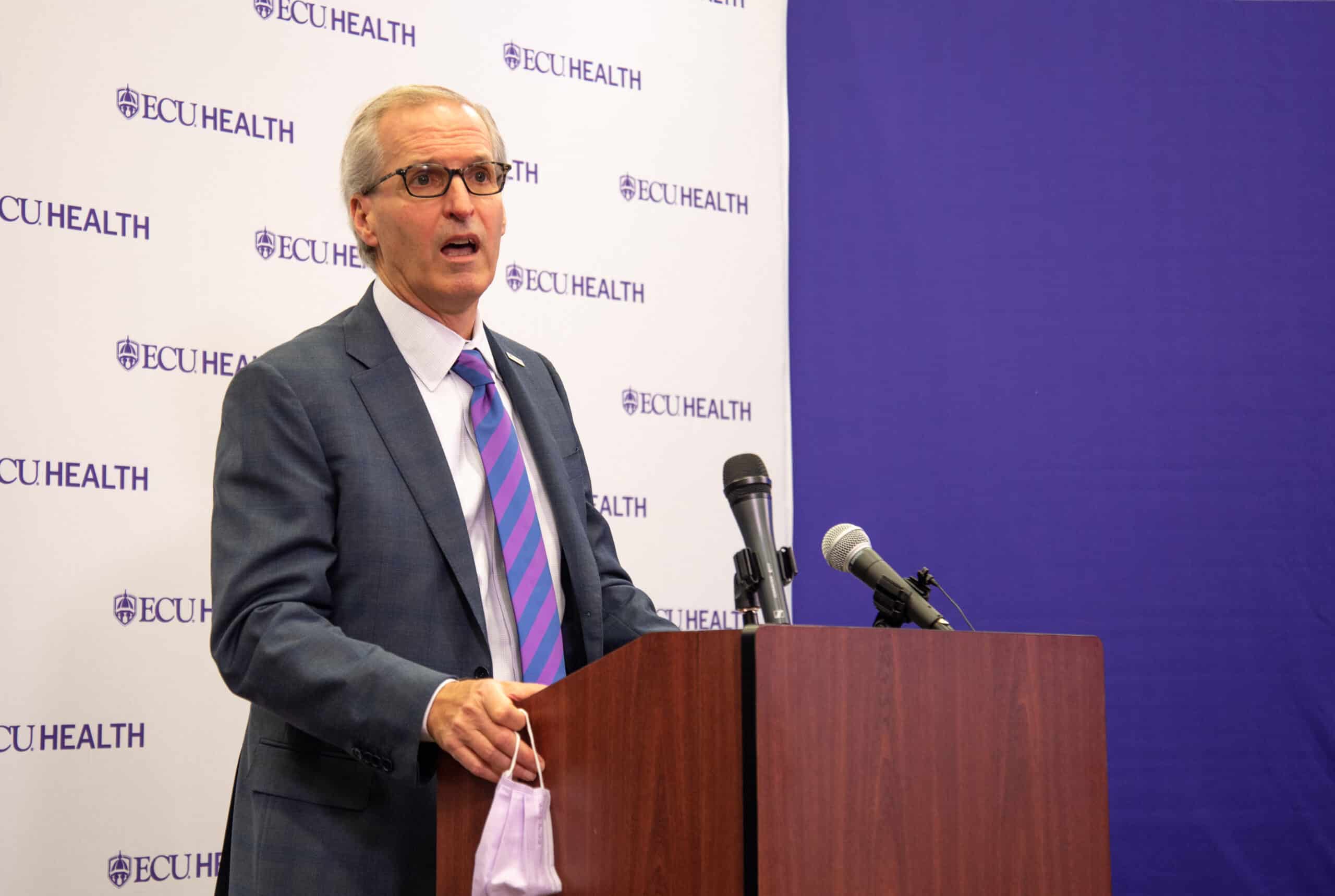
The AAMC leads and serves America’s medical schools and teaching hospitals and individuals employed across academic medicine, including more than 191,000 full-time faculty members, 95,000 medical students, 149,000 resident physicians, and 60,000 graduate students and postdoctoral researchers in the biomedical sciences. This year, the Association of Academic Health Centers and the Association of Academic Health Centers International merged into the AAMC, broadening the AAMC’s U.S. membership and expanding its reach to international academic health centers.
Dr. Waldrum, who was first appointed to the AAMC Board of Directors in November 2020, will begin his new term Nov. 15 and will also serve as chair of the AAMC’s Council of Teaching Hospitals and Health Systems.
“This is such an important time in our industry and as chair of COTH, I look forward to bringing premier academic health systems together to define solutions that strengthen our health care workforce, support our students, advance research and address disparities, specifically in rural communities,” Waldrum said.
The AAMC is a nonprofit association dedicated to improving the health of people everywhere through medical education, health care, medical research and community collaborations. Its members comprise all 155 accredited U.S. and 16 accredited Canadian medical schools; approximately 400 teaching hospitals and health systems, including Department of Veterans Affairs medical centers; and more than 70 academic societies.
The North Carolina Coalition of the Year award is based on the coalition’s positive outcomes of the child passenger safety program, medication safety programs and maintaining partnerships.
“It was a huge surprise,” Injury Prevention Program coordinator at ECU Health Medical Center Ellen Walston said. “Lisa Blackmon with Safe Kids NC said our social media really was the catalyst for winning the award. We post multiple times a week on our risk areas in injury prevention, and it’s just really important to use those quick soundbites to get the word out.”
Preventable injuries are the number one cause of death in kids in the United States, according to Safe Kids. That’s why Safe Kids Pitt County works to prevent injuries in children and adults through simple tips and safety checks. The Safe Kids Pitt County team strives every day to keep kids in eastern North Carolina safe and healthy and to meet ECU Health’s mission of improving the health and well-being of eastern North Carolina.
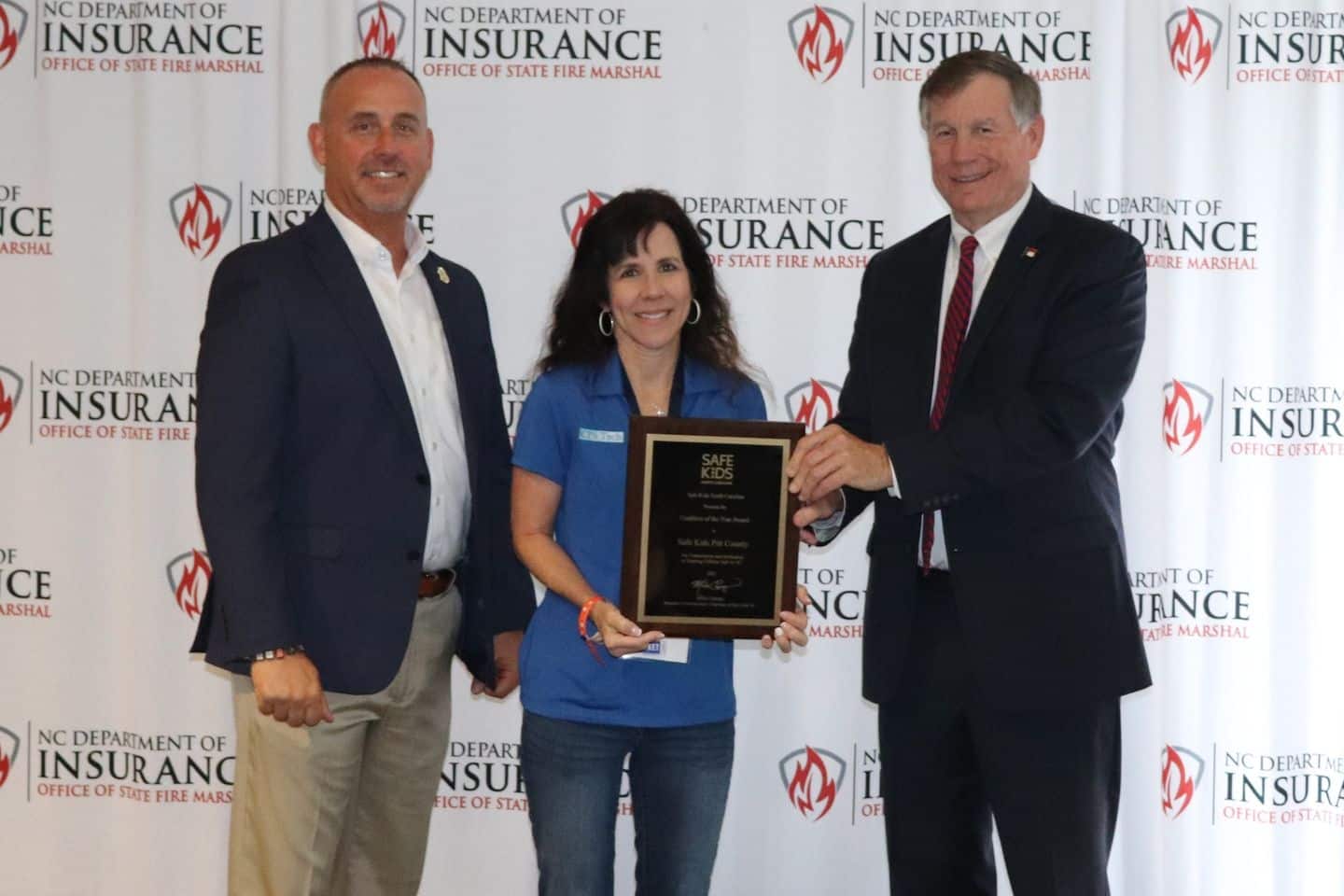
A “hallmark” program
Walston called the child passenger safety program the hallmark of the coalition’s work. The program began in the early 2000s and, along with pop-up opportunities for car seat inspections, Safe Kids Pitt County has a permanent checking station. The permanent station is located at the Winterville Fire Department and is available on the third Friday of each month, 1:30-4:30 p.m.
“To me that parent’s expression of appreciation is priceless,” Walston said. “When they walk in, they just have that look of ‘I don’t know how in the world to put this seat together. Will you please help me?’ Then when they leave, you ask them ‘Are you confident in being able to put this seat in yourself?’ You just see that anxiety just melt away. That to me is the most comfort, knowing that we’ve made a difference.”
More than half of car seats are not used or installed correctly, according to Safe Kids. Correctly used child safety seats can reduce the risk of death by as much as 71 percent.
The child passenger safety program also covers free child safety seat checks when someone has received a violation, citation or ticket. The child and parent will receive one-on-one education to help ensure correct car seat installation, and the program also offers hot car safety information sessions, as well. For more information on this program or general car seat inspections, contact Walston at 252-847-8532.
Medication safety
Medication safety was another key driver for the award, and Operation Medicine Drop is an event that helps the public dispose of expired, unused or unwanted prescription drugs or over-the-counter medications. The event serves to protect children, our community and the environment. Medicines are the leading cause of child poisoning, and proper disposal of medications can largely prevent them from happening. The valuable education sessions offered throughout the community on medication safety help to reduce unintentional poisoning from prescription medications, which is on the rise in North Carolina.
Walston said the opportunity to connect with families and children is vital to the program’s success.
“We have a lot of anecdotal affirmation from children on this kind of education session,” Walston said. “I will see children in the store and they’ll say, ‘Miss Ellen, you came to my school and talked about fire safety’ or ‘You were at the park in Winterville and taught us about medication safety.’ Just making those contacts is so important, we never know when we’re planting that seed. Those children can go home and tell their siblings and tell their families what they’ve learned.”
Key Partnerships
Working with a small internal team makes it crucial to have great partnerships, Walston said. Safe Kids Pitt County primarily partners with Martin-Pitt Partnership for Children, ECU’s TEDI BEAR Children’s Advocacy Center and the Pitt County Health Department. Other partners include Greenville Fire Rescue, Winterville Fire Rescue, Pitt County Sheriff’s Department and Greenville Police Department.
“We’re so blessed with partnerships. I cannot do this work alone,” Walston said. “I just enlist partners, I’ve learned to delegate, I ask for help when I need it. We’re a small team but mighty and we get a lot done.”
Walston also shared appreciation for ECU Health Medical Center, the lead agency for the Safe Kids Pitt County coalition.
“I really want to emphasize a big thanks to ECU Health Medical Center for being here for us since 1995,” Walston said. “They provide all the technical support for me to be in this role – my office, the hours that I designate. We’re really blessed. A lot of hospitals are lead agencies but [other coalitions] don’t get the same support that I’ve received from the hospital.”
Past Recognitions
This is the second time Safe Kids Pitt County has received North Carolina Coalition of the year, first taking home the award in 2010. Other past recognitions include Safe Kids NC Outstanding Outreach Initiative and NC Child Passenger Safety Outreach Program of the Year award in 2016, as well as Walston earning Coordinator of the Year in 2013.
Learn more about Safe Kids Worldwide here.
